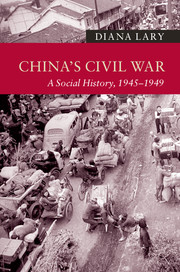Book contents
- Frontmatter
- Dedication
- Contents
- List of figures
- List of tables
- List of maps
- Acknowledgements
- Introduction
- 1 The social background to the Civil War
- 2 Ending one war, beginning another: August 1945–June 1946
- 3 Turning points: July 1946–June 1947
- 4 All-out war: July 1947–June 1948
- 5 Nearing the end: July 1948–January 1949
- 6 The end game: February–December 1949
- 7 Immediate outcomes: the early 1950s
- 8 Social outcomes of the Civil War
- Conclusion
- Glossary
- Index
5 - Nearing the end: July 1948–January 1949
Published online by Cambridge University Press: 05 March 2015
- Frontmatter
- Dedication
- Contents
- List of figures
- List of tables
- List of maps
- Acknowledgements
- Introduction
- 1 The social background to the Civil War
- 2 Ending one war, beginning another: August 1945–June 1946
- 3 Turning points: July 1946–June 1947
- 4 All-out war: July 1947–June 1948
- 5 Nearing the end: July 1948–January 1949
- 6 The end game: February–December 1949
- 7 Immediate outcomes: the early 1950s
- 8 Social outcomes of the Civil War
- Conclusion
- Glossary
- Index
Summary
By the last half of 1948 it was clear that the GMD was going to lose the Civil War. Apart from those who believed in Marxism and were convinced that the CCP was destined for victory, the supporters of the GMD were losing hope. The GMD armies had lost the initiative. The GMD was still strong, in military terms, and it controlled an enormous government and political apparatus. It was recognised by all major foreign states and was a major international player. As one of the victorious allies in the Second World War, China was a key member of the body that was to guarantee future world peace, the United Nations. China sent a team to the 1948 Olympic Games in London. There were no medals, but the few athletes were described as ‘beaten but not disgraced’.
And yet deep within the GMD people felt the end was near. The American diplomat John Melby noted the feeling, almost of panic, that gripped the GMD world: ‘Nanking and Shanghai are tense to the point of panic and there is still no food. Never have I seen anything like the emptiness of the stores and the lines of people hoping that something, anything will come in. In China now, where events usually move slowly, everything is moving at a fearful rate.’
In the GMD military there was something close to despair about the worsening military situation. Chiang Kai-shek was intent on pursuing his own, costly strategies, concentrating huge forces in the north. He refused to let the best GMD commanders, notably Bai Chongxi, play any significant role in the grand strategy. Chiang's stubbornness was his (temporary) downfall. He lost so much support within the GMD that in January 1949 he was forced into ‘retirement’; vice-president Li Zongren took over as acting president.
- Type
- Chapter
- Information
- China's Civil WarA Social History, 1945–1949, pp. 138 - 167Publisher: Cambridge University PressPrint publication year: 2015



